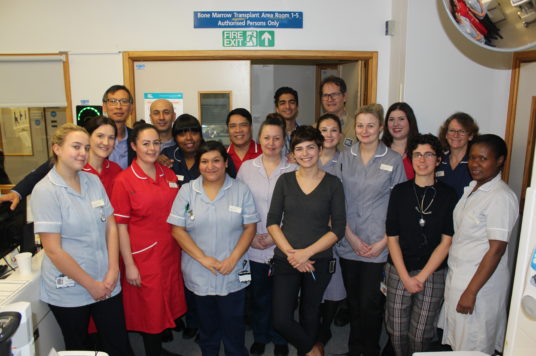Stem Cell Transplant Team achieve top results in latest figures
Latest figures from NHS England show that our Stem Cell Transplant Team at St George’s is performing better than the rest of the UK.
Stem cell (also known as bone marrow) transplantation can achieve long lasting cures for some patients with blood cancers and bone marrow failures but it also carries associated risks undergoing the procedure.
The recent national data shows that we have no patients dying within 100 days of having a stem cell transplant. This is compared to the national average of 10%. The second parameter shows that after one year, 100% of our patients are alive following transplantation compared to 89% of patients nationally. These results reflect the success of transplants undertaken at St George’s.
The team has also undertaken more stem cell transplants at St George’s than ever before, with figures doubling from 10 years ago.
The transplant unit is a medium sized service, which has its advantages in that it remains consultant-led with a close-knit multidisciplinary team – including clinicians, a quality manager, data manager, clinical nurse specialist, dietitian, physiotherapist, pharmacist, apheresis staff and psychological support – who all work together to deliver personalised care to all patients so that they are well informed before and after undergoing this major procedure.
Dr Mickey Koh, Consultant Haematologist and Clinical Lead for Stem Cell Transplantation at St George’s, said: “It’s fantastic to see how well we have performed compared to the national average. I’m very proud of the whole team who work together incredibly well which creates the best results for our patients. This is testimony to their dedication and skill”
St George’s is extremely fortunate to have a full complement of ancillary supportive specialties – such as intensive care, infectious diseases, microbiology, radiology and gastroenterology – providing invaluable support to the transplant team by taking a cohort of very immunosuppressed patients through a transplant.
Dr Mickey Koh added: “St George’s is one of the few hospitals to have the full complement of specialities working closely with the transplant team who understand the intricacies of preparing and taking a patient through a transplant.”



